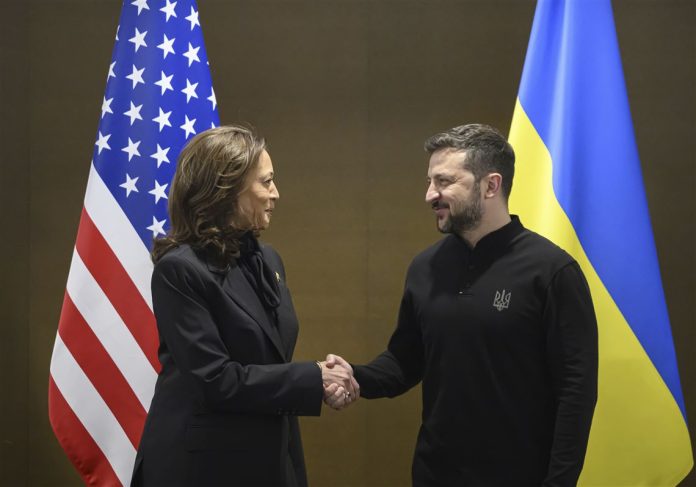The two-day summit marked one of the Ukrainian President’s attempts to attract countries outside Europe and North America to his vision of ending the conflict.
The meeting, according to Switzerland, is expected to be attended by 57 heads of state and government, but many non-Western countries refused to endorse Volodymyr Zelensky’s full peace formula. Therefore, the participants in the conference decided to focus on nuclear security, food security and humanitarian issues.
The aim of the conference in Switzerland is to consolidate support for Ukraine’s negotiating position in its war with Russia with the support of as many countries as possible. According to Zelensky, Ukraine’s intention lies in negotiating with Russia collectively. On Saturday, he said once the countries agree on an “action plan” to end the war, “it will be communicated to the representatives of Russia” at a second conference to which Russia is set to be invited.
Some countries have questioned the value of the peace talks in Switzerland because the conference can lead to nothing if one side of the conflict is absent.
Russia’s absence
As world leaders took turns speaking at the start of the summit, Russia’s absence rapidly became a hot-button issue. Many leaders voiced their concern over Russia’s absence. Some major countries refusing to attend the meeting. China and Brazil are backing their own negotiation proposals, insisting that Russia and Ukraine need to negotiate directly. Beijing said 45 countries have responded favourably to Brazil and China’s offer of negotiations, without naming countries.
Hakan Fidan, the Turkish foreign minister, said: “This summit could have been more result oriented if the other party to the conflict – Russia – was present in the room.” Prince Faisal bin Farhan, the foreign minister of Saudi Arabia, underlined in a statement that “any credible process will require Russia’s participation.”
The Swiss president, Viola Amherd, acknowledged that “a peace process without Russia is inconceivable.” She added the conference would also discuss under what conditions Russia could be included in the process.
Celso Amorim, the chief foreign policy adviser to President Luiz Inácio Lula da Silva of Brazil, who was in neighbouring Geneva for a UN trade conference, said peace talks without Russia’s participation were useless. He said: “You don’t negotiate with your friends. You negotiate with your adversaries. I’m not defending one side or the other, but I, for one, am very clear that nothing will come from this meeting in Switzerland. I respect the intentions, but it’s obvious that nothing will happen.”
Russian President Vladimir Putin also called the meeting in Switzerland meaningless without Russia’s participation: “It is impossible to reach a solution in Ukraine without Russia’s participation, without an honest dialogue with Russia.” He also said on Friday he would order a ceasefire in Ukraine and begin negotiations if Kyiv begins withdrawing troops from four regions under Moscow’s control and leaves plans to join NATO.
Biden went to California to meet with Hollywood stars
President Biden, who has travelled to Europe twice in recent weeks to celebrate D-Day and the G7 summit, decided not to attend the meeting. The decision to skip the Ukraine summit underscores the competing election-year demands Biden faces amid attempts to balance complex domestic and foreign policies while opposing former President Donald Trump.
Zelensky has been publicly urging Biden and other world leaders to attend the meeting for months. He desperately warned their absence might further strengthen the Russian President’s position in the conflict in Ukraine. Biden ultimately decided to send Harris and White House national security adviser Jake Sullivan to represent the administration.
Earlier, Biden flew from Europe to California to hold a fundraiser with Hollywood stars George Clooney and Julia Roberts on Saturday night.
Speech by Vice President Kamala Harris, her departure
Speaking at the conference, Kamala Harris announced $1.5 billion in US aid through the State Department and the US Agency for International Development. This includes money for energy aid, repairing damaged energy infrastructure, helping refugees and strengthening civil security. She decided to return to Washington on Saturday night. Insted, Sullivan said he will stay in Harris’ place to strategise practical solutions to support Ukraine’s nuclear, energy and food security.
Biden has increasingly turned to Harris as he tries to reassemble the coalition of voters behind defeating Trump to win the November election, which is in doubt because of the president’s condition. Harris has taken a more prominent role in introducing Biden to various segments of the Democratic base.
Harris’s credibility among Americans is also declining. According to a recent poll by the Associated Press and NORC’s Center for Public Affairs Research, about 4 in 10 registered voters have a somewhat or very positive view of Harris. About half have a relatively or very unfavourable opinion of her, and about 1 in 10 don’t know enough to say. Her favourability rating is similar to Biden’s.
The US and Ukraine on Thursday signed a security agreement committing the US to continue training Ukraine’s armed forces for 10 years, expand co-operation in the production of weapons and military equipment, and enhance intelligence sharing. G7 leaders, in turn, announced a $50 billion loan package for Kyiv earlier this week.
